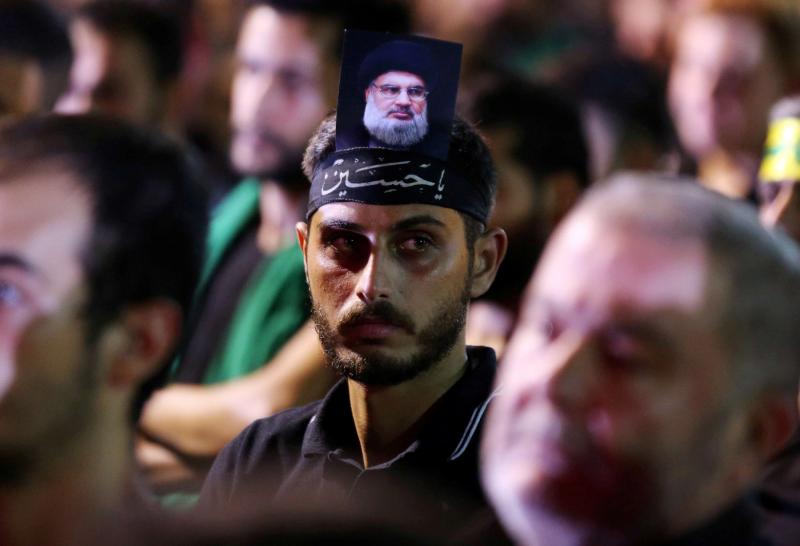Hezbollah on verge of bankruptcy as Iran sanctions bite
مكرم رباح/حزب الله على حافة الإفلاس بنتيجة بدأ فاعلية العقوبات على إيران
Makram Rabah/The Arab Weekly/March 17/19
The waste of public funds makes Hezbollah no different from the rest of Lebanon’s decrepit political parties.
Hezbollah Secretary-General Hassan Nasrallah’s recent speech was not out of the ordinary because it touched on mundane topics from his usual threats against the West and Israel if they attack Iran or Lebanon to reaffirming his party’s supposed commitment to fight corruption.
But the purpose of Nasrallah’s televised speech was none of those issues. It was for him to declare Hezbollah’s bankruptcy and warn his supporters to brace for harder times.
Nasrallah did not use the term “bankruptcy” but his underlying tone, despite the brutish manner with which it was delivered, reflected the efficacy of the US sanctions against Iran and its various militias across the region.
The sanctions’ crippling effects transcend the ability of the Iranian auxiliaries to maintain their military structure but hit at the heart of their civilian social service network, which Hezbollah uses to maintain its ideological and political hold over its followers.
Nasrallah’s speech comes as an acknowledgment of his community’s inability to provide many of the essentials Hezbollah used to ensure — from basic salaries and financial subsides to more luxury services such as the free religious excursions to Shia shrines in Iraq and Iran.
Iran’s financial support for Hezbollah grew over the years as the latter took on more duties that transcended Lebanon, making it a regional and international enforcer of Iran’s expansionist project.
At an estimated $700 million in direct Iranian money transfers a year, Hezbollah never found it necessary to forage for funds from the Lebanese clientelistic networks and Lebanese public funds.
However, Hezbollah’s dire economic conditions could force it to use the state to pay for its elaborate social provisions, including the medical bills of wounded soldiers in Syria and assistance to their extended families.
Nasrallah called on the Hezbollah community to engage in a “financial jihad” and to donate money to the resistance, which would allow it to soldier through the financial war waged against it by the Trump administration.
Nasrallah’s wishful request, however, will not compensate for Iran’s lost millions but is rather a staunch message to his base of the need to embrace new and perhaps open-ended austerity measures.
Another of Nasrallah’s talking points was a threatening message to his local Lebanese opponents, particularly Lebanese Prime Minister Saad Hariri, leader of the Lebanese Forces political party Samir Geagea and Druze leader Walid Jumblatt, that Hezbollah would be demanding its share of the clientelist pie and that any attempt to block it would be perceived as an act of war.
In a direct threat to Jumblatt, who had earlier used Sun Tzu’s river analogy, Nasrallah declared: “Those who have been anxiously waiting by the river for our corpses to float by due to our impoverishment, I assure them they will be greatly disappointed.”
Considering the lack of Iranian funds, Hezbollah seriously needs financial help, which it would get from projects earmarked at the CEDRE conference that committed $11 billion in grants and loans to the Lebanese government to overhaul its deteriorating infrastructure and economy.
Yet, Hezbollah’s ambitious plans to compensate for a lack of Iranian funding might hit a brick wall, one which it helped build. Most of the $11 billion from CEDRE are pledges that hinge on the Lebanese state’s ability to enact much needed structural reforms, which needs the full commitment of the various parties involved, including Hezbollah.
As it stands, Hezbollah’s attitude and its bullying of the Lebanese state makes reforms impossible.
There is no reason for Nasrallah’s foes and perhaps some of his allies to concede defeat and allow for Iran to continue its assault on the West and Gulf Arab states using Lebanese funds, a fact that would convince the Gulf states that their possible investment in Lebanon’s economic salvation is undeserving and counterproductive.
Hezbollah has planned for this financial doomsday scenario and might have ways to delay its bankruptcy. However, the real challenge the Shia group has failed to meet is staying away from the Lebanese honeypot of public funds.
The waste of public funds makes Hezbollah no different from the rest of Lebanon’s decrepit political parties, with the only difference being Hezbollah’s pursuit of the welfare of Iran rather than that of the Lebanese people whom they claim to protect.
Written By Makram Rabah
*Makram Rabah is a lecturer at the American University of Beirut, Department of History. He is the author of A Campus at War: Student Politics at the American University of Beirut, 1967-1975.




















